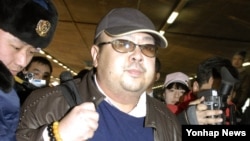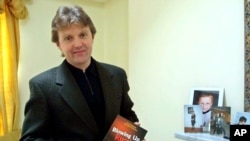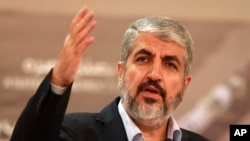A look at notable assassinations or attempted assassinations involving poison or chemicals:
Kim Jong Nam
Kim Jong Nam, the outcast half brother of North Korea’s leader, was poisoned amid crowds of travelers at Kuala Lumpur’s airport, February 14, 2017. He died the same day on the way to a hospital after telling medical workers that he had been attacked with a chemical spray. Malaysian police said that his two female assailants had used the powerful toxin VX, a chemical warfare agent.
Though not an obvious political threat to Kim Jong Un, Kim Jong Nam may have been seen as a potential rival in North Korea’s dynastic dictatorship. Malaysia hasn’t directly accused the North Korean government of being behind the poisoning, but officials said that four North Korean men provided the women with poison.
Alexander Litvinenko
Litvinenko, a former Russian intelligence agent, was given tea laced with a fatal dose of polonium-210 at a London hotel, November 1, 2006. He died three weeks later of “acute radiation syndrome.”
In January 2016, a British judge said Russian President Vladimir Putin probably approved a plan by Russia’s FSB security service to kill Litvinenko, who had become a Britain-based critic of the Kremlin. Litvinenko made a deathbed statement that he was poisoned on orders from Putin. No one has ever stood trial for the killing, which soured Russian-British relations for years.
Victor Yushchenko
Then a Ukrainian presidential candidate, Yushchenko fell ill from a massive dioxin poisoning in September 2004 that knocked him off the campaign trail for weeks and left his face severely pockmarked.
Despite the near-fatal illness and several contested runoffs, Yushchenko won the presidency on a wave of popular support that was dubbed the Orange Revolution. In October 2005, the incident was declared to be “an assassination attempt” by Ukraine’s Prosecutor General Svyatoslav Piskun.
Khaled Mashaal
Agents from Israel’s secret intelligence service, Mossad, sprayed a substance believed to be a fentanyl analog into the Hamas leader’s ear as he walked down a street in Amman, Jordan, in a botched 1997 assassination attempt.
Jordan’s King Hussein threatened to hang the captured Mossad agents in a downtown square unless Israel provided an antidote, which it did. Israel’s relations with Jordan were shaken by the botched assassination, and Prime Minister Benjamin Netanyahu was forced to free a number of Palestinian prisoners in exchange for the agents. After the agents were released, then-Infrastructure Minister Ariel Sharon declared on Israeli television that Israel would try again.
Georgi Markov
Markov, a Bulgarian dissident, was waiting for a bus at Waterloo Bridge in London in September 1978 when he was jabbed in the thigh with a poisoned umbrella tip in one of the most sensational assassinations of the Cold War. The journalist and harsh critic of Bulgaria’s communist regime died four days later.
After his death, British government scientists discovered the umbrella had been used to inject a pinhead-sized pellet of the poison ricin into Markov’s leg. Though no one has ever been charged with the killing, many suspected the KGB and Bulgarian secret police of involvement.








